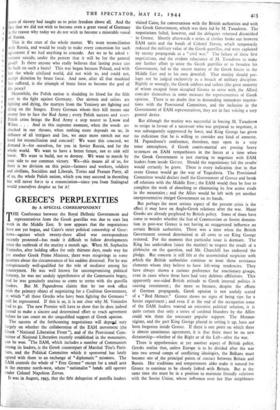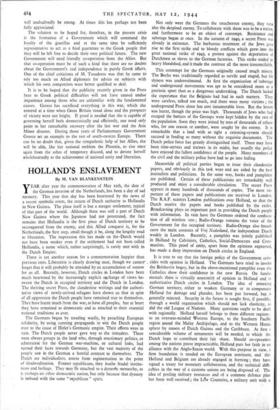GREECE'S PERPLEXITIES
By A SPECIAL CORRESPONDENT
THE Conference between the Royal Hellenic Government and representatives from the Greek guerillas was due to start last week in the Middle East. It now appears that the negotiations have not yet begun, and Cairo's strict political censorship of Greet news—against which twenty-three allied war correspondents recently protested—has made it difficult to follow developments since the outbreak of the mutiny a month ago. When M. Sophocles Venizelos, after holding office for only thirteen days, made way for yet another Greek Prime Minister, there were misgivings in some quarters about the circumstances of his sudden dismissal. For he was conspicuously well-qualified for the role of mediator among his countrymen. He was well known for uncompromising political honesty, he was not unduly apprehensive of the Communist bogey, and he was genuinely anxious to come to terms with the guerilla leaders. But M. _Papandreou claims that he too took office with the primary object of negotiating for a Coalition Government, in which "all those Greeks who have been fighting the Germans" will be represented. If this is so, it is not clear why M. Venizelos had to go. The new Premier will have to show that he does indeed Intend to make a sincere and determined effort to reach agreement before he can count on the unqualified support of Greek opinion.
The success of the forthcoming negotiations will depend 'very largely on whether the collaboration of the EAM movement (the Greek "National Liberation Front"), and of the Provisional Com- mittee of National Liberation recently established in the mountains, can be won. 'The EAM, which includes a number of Communists among its leaders, is the Greek counterpart of Marshal Tito's Parti- sans, and the Political Committee which it sponsored has lately agreed with them to an exchange of "diplomatic" missions. The EAM controls the whole of " Free Greece" except for a small area in the extreme north-west, where "nationalist " bands still operate under Colonel Napoleon Zervas.
It was in August, 5943, that the flat delegation of guerilla leaders
visited Cairo, for conversations with the British authorities and with the Greek Government, which was then led by M. Tsouderos. The negotiations failed, however, and the delegates returned dissatisfied to Greece. Shortly afterwards a series of clashes broke out between EAM units and the bands of Colonel Zervas, which temporarily reduced the military value of the Greek guerillas, and were exploited by enemy propaganda as a " civil war." The failure of these first negotiations, and the evident reluctance of M. Tsouderos to make any further effort to unite the Greek guerillas or to broaden his Government, led to the recent mutiny of the Greek forces in the Middle East and to his own downfall. That mutiny should per- haps not be judged exclusively as a breach of military discipline. Rightly or wrongly, the Greek soldiers and sailors (the great majority of whom escaped from occupied Greece to serve with the Allies) consider themselves in some measure the representatives of Greek opinion. There is no doubt that in demanding immeatate negotia- tions with the Provisional Committee, and the inclusion in the Government of EAM representatives, they are in fact voicing a very general desire.
But although the mutiny was successful in forcing M. Tsouderos to resign in favour of a successor who was prepared to negotiate, it was subsequently suppressed by force, and King George has given no indication that he is willing to consider any kind of amnesty. M. Papandreou's conference, therefore, may open in a very tense atmosphere, if Greek courts-martial are passing heavy sentences on EAM sympathisers in the forces at a time when the Greek Government is just starting to negotiate with EAM leaders from inside Greece. Should the negotiations fail the results' would certainly be grave. There is every indication that in that event Greece would go the way of Yugoslavia. The Provisional Committee would declare itself the Government of Greece and break off relations with the Middle East ; the EAM would then be free to complete the work of absorbing or eliminating its few active rivals in the mountains ; and the Allies would be left with yet another unrepresentative emigre Government on its hands.
But perhaps the most serious aspect of the present crisis is the effect it may have on Anglo-Greek relations after the war. Many Greeks are already perplexed by British policy. Some of them have come to wonder whether the fear of Communism or Soviet domina- tion in post-war Greece is not having an exaggerated influence on certain British authorities. There was a time when the British Government seemed determined at all costs to see King George restored. For the moment that particular issue is dormant. The King has undertaken (since the mutiny) to respect the result of a plebiscite on the question, and Mr. Churchill has endorsed the pledge. But concern is still felt at the unconcealed suspicion with a'hich the British authorities continue to treat those resistance elements whom they believe to have left-wing tendencies. They have always shown a curious preference for reactionary groups, even in cases where these have had very dubious affiliations. This apparently one-sided British attitude to Greek internal politics is causing resentment ; the more so because, despite the efforts of German propaganda, Greek opinion is not unduly scared of a "Red Menace." Greece shows no signs of being ripe for a Soviet experiment ; and even if at the end of the occupation some of the EAM leaders wanted an extremist political solution, it is quite certain that only a series of cardinal blunders by the Allies could win them the necessary popular support. The Metaxas regime, and the part King George played in setting it up, have not been forgotten inside Greece. If there is one point on which there is almost unanimous agreement, it is that there must be no new dictatorship—whether of the Right or of the Left—after the war.
There is apprehension at yet another aspect of British policy. Greeks realise that, unless Europe is to be divided after the war into two armed camps of conflicting ideologies, the Balkans must become one of_the principal points of contact between Britain and Russia. Her traditions and temperament alike make it natural for Greece to continue to be closely linked with Britain. But at the same time she must be in a position to maintain friendly relations with the Soviet Union, whose influence over her Slav neighbours will undoubtedly be strong. At times this has perhaps not been fully appreciated. The solution to be hoped for, therefore, in the present crisis is the formation of a Government which will command the loyalty of the guerillas and at the same time be sufficiently representative to act as a final guarantee to the Greek people that they will be left free to decide their own political future. The new Government will need friendly co-operation from the Allies. But that co-operation must be of such a kind that there are no doubts about the Government's real independence in purely Greek affairs. One of the chief criticisms of M. Tsouderos was that he came to rely too much on Allied diplomats for advice on subjects with which his own compatriots were better qualified to deal.
It is to be hoped that the publicity recently given in the Press here to Greek political difficulties will not have caused undue impatience among those who are unfamiliar with the fundamental causes. Greece has sacrificed everything in this war, which she entered at a time when Great Britain stood alone and the prospects of victory were not bright. If proof is needed that she is capable of governing herself both democratically and efficiently, one need only point to her remarkable recovery after the last war and the Asia Minor disaster. During those years of Parliamentary Government Greece set an example to the rest of south-eastern Europe. There can be no doubt that, given the sympathetic help of her Allies, she will be able, like her national emblem the Phoenix, to rise once again from the ashes of temporary discord, and to devote herself wholeheartedly to the achievement of national unity and liberation.



























 Previous page
Previous page